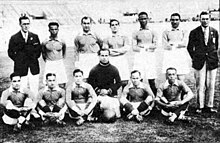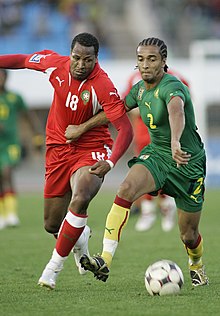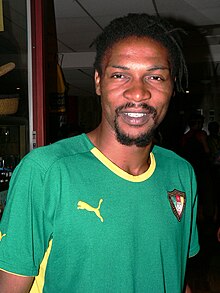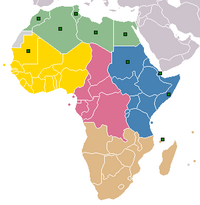Portal:Football in Africa
Introduction
Football is the most popular sport in Africa, alongside basketball. Indeed, football is probably the most popular sport in every African country, although rugby and cricket are also very popular in South Africa. The first football stadium to be built in Africa was the Alexandria Stadium in 1929.
The English Premier League is the most popular sports league in Africa. The most popular clubs in Africa are Arsenal, Chelsea and Manchester United. (Full article...)
This section may be unbalanced toward certain viewpoints. (October 2022) |

Selected article -
Kaizer Chiefs Football Club (often known as Chiefs) is a South African professional football club based in Naturena, Johannesburg South, that plays in the Betway Premiership. The team is nicknamed AmaKhosi, which means "Kings" or "Chiefs" in Zulu, and the Phefeni Glamour Boys. Chiefs have won 13 league titles (four in the PSL era) and over 42 cup trophies. The club's most recent trophy was the Shell Helix Ultra Cup trophy it won on 12 October 2019. As a result, they hold the most trophies amongst all clubs in South Africa and are the most successful team in South African football history since the start of the top flight in 1970. They are the most supported club in the country, drawing an average home attendance of 16,144 in the 2019–20 season, the highest in the league. It led to them being dubbed "The Biggest Club" in Southern Africa. The team plays its home matches at the 94,797-capacity FNB Stadium.
The team has a strong local rivalry with Orlando Pirates, a fellow Soweto team that Chiefs founder Kaizer Motaung played for in his early playing career. Famous players who donned the black-and-gold jersey in the past include former national team captains Neil Tovey and Lucas Radebe as well as Patrick Ntsoelengoe, Gary Bailey, John "Shoes" Moshoeu, Shaun Bartlett, Steve Komphela, Siyabonga Nomvete, and Doctor Khumalo.
Kaizer Chiefs were banned by the African Football (CAF) from competing in African club competitions until 2009 after their abrupt withdrawal from the 2005 CAF Confederation Cup. This was the second time in four years that Chiefs had been penalized by CAF for refusal to participate in a competition.
Selected biography -
Rigobert Song Bahanag (born 1 July 1976) is a Cameroonian former professional footballer who was most recently the manager of the Cameroon national team.
Known for his defensive skills, Song usually played as a centre-back, but could also operate at right-back. Internationally, he played at a record eight Africa Cup of Nations tournaments and served as captain in five (the ones he was not captain for were South Africa 1996, Burkina Faso 1998 and Angola 2010), a record, and holds the record of most consecutive games played in the tournament with 35 first team games. He has won two CAF Africa Cup of Nations titles in 2000 and 2002. In 2009, Song was dropped as Cameroon skipper by new coach Paul Le Guen, who eventually appointed Samuel Eto'o as the new captain, which later caused concerns, as Song had never been on the bench in more than eleven years for Cameroon. With 137 appearances, Song also holds the record of the most capped player in the history of the Cameroon national team and has played in four World Cups, in 1994, 1998, 2002 and 2010.
Song started his professional career with Metz and helped the club to win the Coupe de la Ligue in 1996. After appearing at the 1998 World Cup, he joined Salernitana, newly promoted to the top-flight Italian Serie A. In January 1999, he left Italy to start successive stints with Liverpool, West Ham United and 1. FC Köln, but after failing to hold down a first-team place, he returned to France to play for Lens. He stayed there until 2004, before moving on to Turkey, where he spent four years with Galatasaray, winning two Süper Lig titles and the Turkish Cup. Song then signed a contract with Trabzonspor in 2008, where he won another Turkish Cup and stayed until 2010.
Selected image -
 |
Nwankwo Kanu OON (born 1 August 1976) is a Nigerian former professional footballer who played as a forward. He was a member of the Nigeria national team, and played for Nigerian team Iwuanyanwu Nationale, Dutch side Ajax, Inter Milan of Italy, and English clubs Arsenal, West Bromwich Albion and Portsmouth.[9]
Subcategories
Related portals
More sports portals
WikiProjects
Related task forces and sub-projects
African football task force
WikiProject Africa • WikiProject Football
WikiProject Football task forces and sub-projects
 | |
| Wikipedia ads | file info – #250 |
Topics
Open tasks

- Expand stubs: Competitions in Africa • Organizations
- Expand club articles of teams from Africa.
- Expand biographies of Africans involved in football.
- Create: Requested articles • Most wanted football articles • Requested general football articles
- Add: Infoboxes • Images (General requests, Requested images of people)
- Review: articles currently under review
- Assess: Assessment requests • Assess an article
- Revert vandalism on this portal and on African football articles
- Assist in maintaining this portal and keeping its selected content up to date.
- WikiNews: Create and submit news stories about African football for Wikipedia's sister project WikiNews.
Associated Wikimedia
The following Wikimedia Foundation sister projects provide more on this subject:
-
Commons
Free media repository -
Wikibooks
Free textbooks and manuals -
Wikidata
Free knowledge base -
Wikinews
Free-content news -
Wikiquote
Collection of quotations -
Wikisource
Free-content library -
Wikiversity
Free learning tools -
Wiktionary
Dictionary and thesaurus
More portals
Sources

- ^ "The History Of Soccer In Africa". NPR.org. 2010-06-09. Retrieved 2016-03-31.
- ^ a b c Alegi, Peter (2010). African Soccerscapes. Ohio University Press. pp. 1–2. ISBN 9780896802780.
- ^ Frimpong, Enoch Darfah. "Ghana news: A world of superstition, frustration and disillusionment - Graphic Online". Retrieved 23 September 2017.
- ^ Lacey, Marc (8 August 2002). "Kangemi Journal; For Spellbinding Soccer, the Juju Man's on the Ball". The New York Times. NY Times. Retrieved 2016-03-31.
- ^ "World Cup Witchcraft: Africa Teams Turn to Magic for Aid". National Geographic. Archived from the original on July 10, 2006. Retrieved 2016-03-31.
- ^ Andy Mitten (September 2010). The Rough Guide to Cult Football. Rough Guides UK. ISBN 9781405387965. Retrieved 2016-04-02.
- ^ "African Nations Cup overshadowed by hocus pocus | Football". The Guardian. Retrieved 2016-04-09.
- ^ Kuper, Simon (2006). Soccer Against the Enemy: How the World's Most Popular Sport Starts and Stops Wars, Fuels Revolutions, and Keeps Dictators in Power. Nation Books. p. 123. ISBN 978-1-56025-878-0.
- ^ "Nwankwo Kanu". Eurosport.com.

























